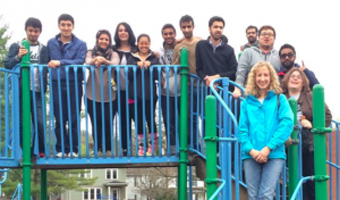By Tetyana Dovbnya
OPIE and College of Arts & Sciences International Student Adviser
It is a well-established fact that the best way to learn something is to experience it. That is why taking students on field trips is a common practice in language learning classes.
A recent Ohio Program of Intensive English trip was undertaken by the students from Exploring American Culture class, under the leadership of OPIE lecturers Kristina Guyton and Sally Hatfield. Visiting East Elementary school and spending a recess with fourth-graders was a great supplement to more “regular” materials on the U.S. education system. Students unanimously agree that they were mostly impressed and puzzled by the “freedom” of elementary school kids, whom they found to be outspoken, mature, polite and confident.
When Seyma Uzun, a Turkish student, first entered the class at East, she thought it was disorganized and messy. “In Turkey,” she says, “the class setting is different. It looks more organized, and the sitting is arranged. But then I saw how students were using a classroom as a living space here.”
A student from Saudi Arabia shared a similar impression, “It was interesting to see different experiences in the elementary school here. For me it was totally different! The focus here is on students, and classrooms look more like home rather than simply a classroom. In Saudi Arabia, the setting was just desks and chairs, with less playtime.”
Mingze Gao, a student from China, made an insightful comment on the differences he noticed between Chinese and American elementary schools.
‘There are less children in the classroom here, while there is more freedom and noise. In China, we had classes one right after another with 10-minute breaks in between,” he said. “There was no choice of the subjects, and there were more rules kids had to follow. Elementary school students in the U.S. have more choice, which builds their personalities. That is how they form their own ideas, and not just follow others’ ideas.”
Since the OPIE team came for a visit with some questions to the East Elementary school students, Mohamed Abid Alrekab, a student from Libya, mentions how impressed he was by their intelligence and detailed answers that they were able to provide. He also noticed a lot of similarities between his elementary school in Libya and what he saw in Athens.
“It is noisy a little bit,” he says with a smile, “and the students behave similarly in the classroom and in the hallways. A lot of activities and energy!”
Akif Gormez, a student from Turkey, was able to find yet more similarities. He was surprised to learn about the multitude of games students play outside of class.
“I told them [the students from East] about the games I used to play as a child. Then, we realized that the games we like are almost the same, such as hide-and-seek, for example. Wherever you go in the world, children are the same,” Gormez says.
“A visit like this provides a great comparison of educational cultures,” Abid Alreka sums up. “We can find flaws in any system of education. However, we need to be able to share the best practices to better understand the nature of a child.”
Indeed, what a great lesson learned!




















Comments